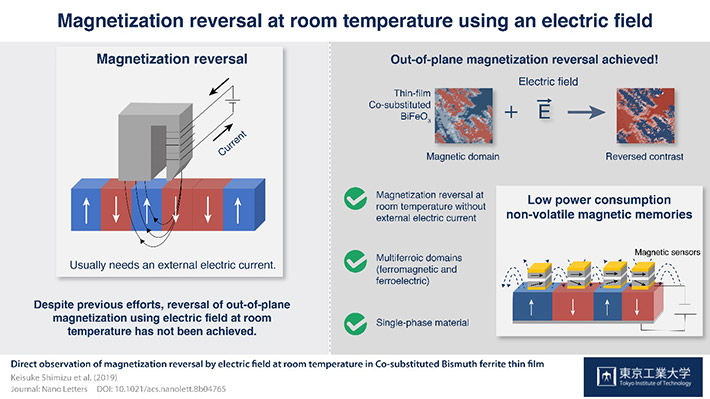Scientists at Tokyo Tech achieved magnetization reversal in cobalt-substituted bismuth ferrite by applying only an electric field. Such an effect had been sought after for over a decade in order to make new types of low-power-consumption magnetic memory devices.

In the era of information technology revolution, electronics demand rapid evolution facilitated by greater efforts from materials researchers to pave the way for further improvements and novel devices. In particular, a better understanding of the electromagnetic properties of various types of materials and new ways to harness them would allow for the fabrication of devices based on such principles.
Two years ago, a research team from the Laboratory for Materials and Structures at Tokyo Tech, led by Prof. Masaki Azuma, demonstrated very promising properties of Cobalt-substituted Bismuth ferrite (BFCO). This peculiar material exhibits both ferroelectric and ferromagnetic properties at room temperature; these two are coupled in a way that, the team inferred, could be exploited to exhibit reversal of the magnetization of the material by application of only an electric field at room temperature without the need of electric current.
In a more recent study, the team presented proof of this hypothesized magnetization reversal in thin films of BFCO at room temperature. While previous researchers saw some success in achieving magnetization reversal, their results were for in-plane magnetization on a multi-layer material, which carries some disadvantages. "Direct observation of magnetization reversal on a single-phase material with ferroelectric and ferromagnetic orderings is crucial to the study of the intrinsic coupling between them. Moreover, out-of-plane magnetization reversal is desirable from the viewpoint of integration," explains Azuma.
Thus, the team fabricated thin BFCO films that exhibited spontaneous magnetization. Because BFCO is very sensitive to lattice strain, these thin films were grown on orthorhombic GdScO3, whose lattice structure matches that of BFCO maximally and bolster the growth of highly crystalline films with minimal lattice strain. After verifying the presence of the sought-after out-of-plane magnetization, the team went on to investigate the correlation between the ferromagnetic and ferroelectric domains to see if magnetization reversal was possible by switching electric polarization.
In the resulting piezoelectric force microscopy and magnetic force microscopy images, the researchers found that their attempts were successful and that it was indeed possible to achieve out-of-plane magnetization reversal using an electric field at room temperature. This represents the first time that such a feat was carried out, and could soon become the operating principle of a new type of memory device, as explains Azuma: "The current demonstration of magnetic reversal using an electric field paves the way to low power-consumption, non-volatile magnetic memories, such as magnetoresistive random-access memories." These findings also bring hope to all researchers in this particular field who, although had collectively been working on magnetization reversal for 15 years, had not yet reported such promising results.
Reference
Authors : |
Keisuke Shimizu1, Ryo Kawabe1, Hajime Hojo1, Haruki Shimizu1, Hajime Yamamoto1, Marin Katsumata, Kei Shigematsu1, Ko Mibu2, Yu Kumagai3, Fumiyasu Oba1, and Masaki Azuma1 |
Title of original paper : |
Direct observation of magnetization reversal by electric field at room temperature in Co-substituted bismuth ferrite thin film |
Journal : |
Nano Letters |
DOI : |
|
Affiliations : |
1Laboratory for Materials and Structures, Tokyo Institute of Technology
2Graduate School of Engineering, Nagoya Institute of Technology
3Materials Research Center for Element Strategy, Tokyo Institute of Technology
|
. Any information published on this site will be valid in relation to Science Tokyo.



